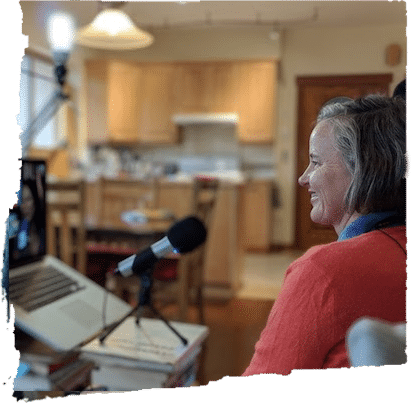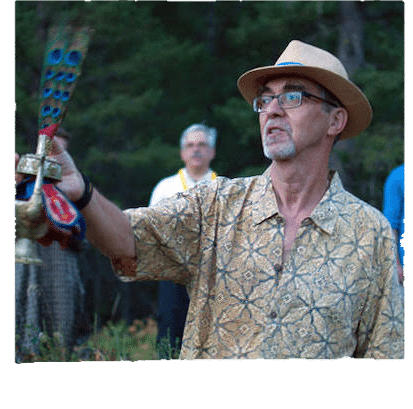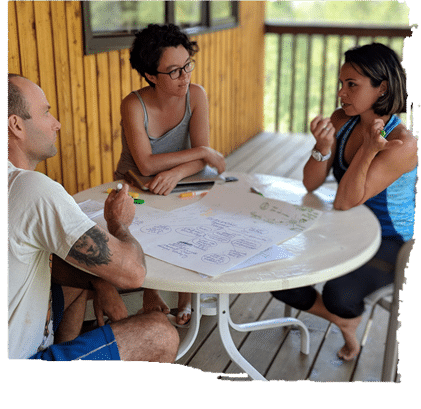New Episodes!
Dharma If You Dare Podcast
What does it take to live a life of meaning and compassion in our busy day-to-day lives? Tune in to get the knowledge and tools you need to help you tackle life’s biggest obstacles joyfully … if you dare!

About Dharma If You Dare
A Planet Dharma Podcast
Dharma Teachers Doug Duncan and Catherine Pawasarat with to share with you the journey to a life of clarity and bliss. Join them on this podcast of excerpts of their live teachings. They share ancient wisdom updated to speak to the current and evolving paradigm of spiritual awakening in our modern age.
Meet the Speakers
Dharma Teachers Qapel (Doug Duncan) and Sensei (Catherine Pawasarat) are spiritual mentors to students internationally and at their retreat center, Clear Sky, in BC, Canada. They are lineage holders in the Namgyal Lineage, both studying under the Venerable Namgyal Rinpoche and other teachers.
Having lived internationally for many years and traveled extensively, Qapel and Sensei draw on intercultural and trans-cultural experience to broaden the range and depth of their understandings of liberation that they share with others.
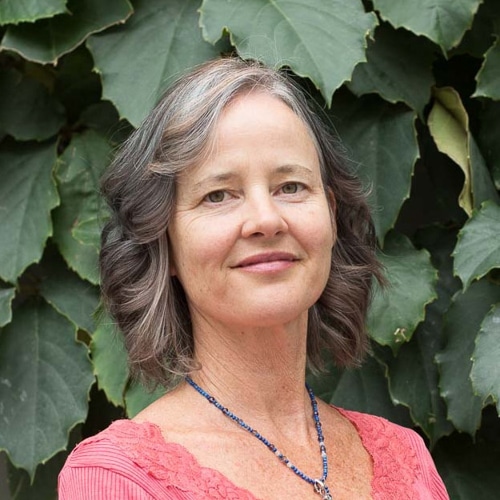
Catherine Sensei
Speaker
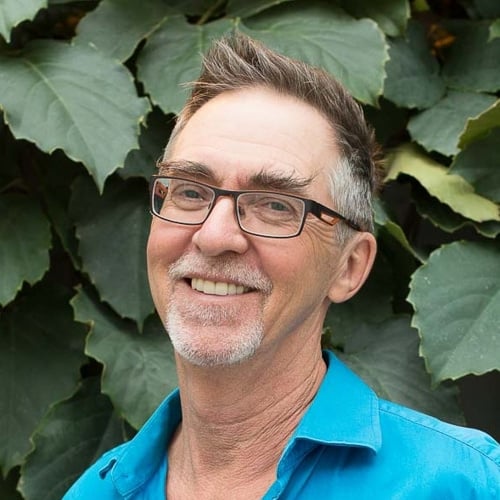
Qapel
Speaker
Dharma if you Dare podcast
Listen Now!
Subscribe to the podcast below on any of your favorite platforms.
The Wave is Also Water: Understanding Spiritual Awakening
Metaphors for Spiritual Awakening
Welcome to Dharma if you Dare. Today’s recording comes from Doug Duncan, and Catherine Pawasarat’s Livestream series Enlighten Up. In this talk, Doug and Catherine discuss the question ‘What is Awakening?’ Known by many terms in various traditions, Spiritual Awakening or Enlightenment is about waking up to our true nature. Doug and Catherine explore several metaphors to help explain what Spiritual Awakening is and why the ego tends to ignore it in favor of getting caught up in the world of objects. Helping people experience Spiritual Awakening is the reason Planet Dharma exists. If you are also passionate about unfolding and awakening deeper and more quickly, we encourage you to enroll in one of our online courses. Each year Doug and Catherine host multiple online courses, live on various topics with the goal of empowering participants to dive deep into their awakening spiritual practice. Learn more about upcoming opportunities to join these online offerings at www.planetdharma.com/online. And now here’s today’s recording.
Qapel: What is Awakening and what would it do for me, or why would I bother? I guess the first thing to say, probably the most obvious thing is, awake is the opposite of asleep. When we’re dreaming or when we’re asleep, we don’t know we’re asleep, we just take it as a reality. And it isn’t until we wake up in the morning that we go: “Oh, we were asleep”. So that’s probably why they use that word. Our normal ego consciousness is mostly run on habits. And because our normal ego consciousness is normally run on habits, 80% of what we do, or more – you can say we’re asleep to our brighter nature. So the Awakening is then about waking up.
Catherine Sensei: Speaking of brighter, I love how it’s embedded in the language because another word for Awakening is Enlightenment. Brighter, getting shiny, lighting up, having a light in your aura. And as Qapel mentioned the opposite of awakening is asleepening and the opposite of enlightenment would be darkness. So the darkness of ignorance.
Q: There is a very famous Mahamudra a book called Eliminating the Darkness of Ignorance. The darkness you can’t see. So as soon as you turn on the light 1000 years of darkness disappears. So this is why this metaphor is used.
CS: So what is Awakening? Let’s give it some context. First, the good news is that we are all Awakening together all the time. That’s just what we’re doing. It’s kind of a process of evolution and as an example, I’ll say that now, generally, most of us agree that things like slavery and racism and sexism are not good and we do what we can to decrease those things in the world. This is really different. It wasn’t that long ago that there wouldn’t be widespread agreement on that statement, that people thought it was just a natural course of things.
So that’s an example of how humanity is waking up together. And we could say that our relationship with the planet is another example of that.
Q: Well if you take the environment for example, we tend to ignore it. We tended to ignore water. We tended to ignore air until it got bad. So once we get dirty water or dirty air, all of a sudden fresh air and fresh water make a lot more sense. So we woke up in a sense to the environment. For centuries we just took it for granted and in that sense we were asleep to the environment.
CS: So again, an example of us Awakening collectively as part of the evolution of humanity.
Q: So what is true for the environment is also true with minority rights, gender, women’s rights, women’s position in the world. Now with the LGBT thing, it’s like those people in America and all over the world really. But America may be the showcase of racial awakening in terms of the rights. When I was a kid, TV was all white, you know everybody on TV was white, but now you see much more diversity in terms of employment and so on. So we’re waking up to all sorts of things that we were previously unconscious to. But when we use the word Awakening in terms of spiritual growth or unfoldment, we’re waking up from the previous sleep of the ego’s not recognizing a bigger picture, and that’s a little harder to come to because the ego has to, in a sense, move or allow itself to move past its own machinations to see the space or the openness behind its objects.
CS: Although we are Awakening together naturally as a natural process and no one wants to live their lives asleep or no one wants to be ignorant as a kind of overall state of being, which is a testimony to the human spirit, however, it’s a slow process and a painful one. So we can speed it up. We’re able to speed it up, both as individuals and as groups. And as communities – that’s one of the things that we are undertaking here at Clear Sky: to awaken more speedily as individuals and as a community. So how do we do that together and as individuals? How do we speed that process up?
Q: Maybe a few metaphors would help.
CS: It is akin to Olympic training. It’s not easy, it’s very intense. You’ve got to have a really burning commitment to it. You’ve got to be willing to overcome challenges on a regular basis. And also it’s extremely helpful, well indispensable, I would say, to have someone who has had the experience before you. So just like an Olympic athlete has a coach or a trainer, that’s also indispensable for spiritual awakening.
Q: And it’s exhilarating. I mean if you’re playing at the top of your game, whether you’re an Olympic athlete or an Olympic cook or an Olympic lawyer or an Olympic doctor or even an Olympic ditch digger – if you’re working at the top of your game, it’s more blissful. It’s more exhilarating. You feel more free, you feel more open. It’s a win-win situation. The problem with a lot of our day-to-day rituals, our day-to-day routines is that we tend to kind of go to sleep in them, as habits, and that’s why these metaphors like the Olympic athlete is such a good idea, it kind of helps you make the same experience brighter.
CS: And the original Olympics were designed where the competition was a kind of admiration, competitors admired one another’s skills and prowess and used that as inspiration to better their own skills. And so a community of awakening beings is incredibly helpful that way as well.
Q: I have a little bit more of a mundane metaphor which is play-doh, you know that squeezy muddy stuff that you form into different shapes. As people we are always making objects. We are making little cows or chickens or whatever, houses or whatever. We’re busy, busy, busy, busy people turning that play-doh into a different kind of object and basically, we ignore the play-doh. So from this point of view, the ego is all the objects you can make with play-doh, including objects that are feelings or sensations or thoughts. So a feeling would be an object, in this case anger would be an emotional object and freedom would be a mental object. But the Awakened mind is actually the play-doh. The play-doh that can take any shape. So the Awakened mind can take any shape, and we’re not very attracted to play doh as just a muddy substance. And of course, the Awakened mind isn’t muddy but there you go. It’s a metaphor.
CS: So anyone who knows anything knows that play-doh is wonderful. Right?
Q: So the Awakened mind is the play-doh. But what the Awakened mind does from there, how what we do with that is egos then become the objects and so we become fascinated with the object and we then ignore the play-doh because we attached the object. One further point in this one is that since play-doh is a sense not formed, all Awakened beings are the same being. All Awakened beings are the same play- doh. And we think we’re different than each other because this is a female object play-doh and this is a male object play-doh and so on and so on and so on. And then we get into these dialogues and projects and everything – which are all amazingly wonderful. But in essence, the Awakened mind is the play-doh.
CS: Kind of like the mycelium and the soil is the same organism, or the bamboo, you know it’s a bamboo forest but it’s actually the same organism underneath. Similar aspens and mushrooms are the same.
Q: Because we’re object people, an ego is an object also. Because we’re object people, all our dialogues and obsessions are with the objects, and we miss this Awakened state.
CS: Especially nowadays when our culture has become so consumeristic oriented. We’re really, not to use too strong a word, but we’re really well… conditioned. I was going to say brainwashed but I’ll use conditioned. We’re very much conditioned to be concerned with objects. And as Qapel has been describing, we mistake what’s really important in life and in the spiritual life what’s really important is this sense of spaciousness. That’s where the Awakening comes from.
Q: Coming back to that sense of spaciousness from it. We don’t really like spaciousness because in that spaciousness there is really no ‘me’ to be found, no Doug there. It’s just a quiet, silent, blissful spaciousness and the ego doesn’t get any reward, objectively speaking, for that. And so it tends to, again, overlook it, try to fill it as soon as possible.
CS: Although when we do allow ourselves to go into that feeling of spaciousness, we love it. Beautiful moments in life that we remember with great joy.
Q: Yes and in fact everything wonderful that we see in objects isn’t inherently in the object. It’s inherently in the play-doh. The play-doh is the source. The state of being is the source. And then we fight about the objects or make love with the objects and we get lost in the objects. But we again miss the pay-doh.
One more metaphor on this one is perhaps the clear sky and the clouds. When we are out in nature, we’ll say “Oh it’s a clear day” and ignore it. But if there are cloud formations that look like little bunnies or cats or crocodiles or birds, now we get involved: there’s an object to put our mind on an object to put our attention on. And so now we think the clouds are what the sky is. But of course, the cloud exists in the sky. But the cloud by itself isn’t the sky. So even a little ducky or a bird in a cloud, that ducky or bird is infused with spaciousness even within it, never mind a cloudless sky.
CS: So you can fly through it with the plane. And that, of course, is what we named our center Clear Sky after – is that clear sky that’s always there regardless of the clouds that we may be perceiving.
Q: So I think a lot of people think when they Awaken, or Awakening is that everything comes to a stop, that it’s all dead and nothing happens and everything gets magically fixed. This is not true, clouds are still clouds. The ducky and the crocodile are still gonna have arguments about who gets to own that particular part of the sky. Stuff still happens. But what happens is: with the background of the understanding you are the sky, then what happens with the clouds becomes more entertainment than problematic. So if the ducky and the crocodile are having a fight, the nature of the Clear Sky Mind goes “Fascinating, I’m not sure what they’re getting so upset about because pretty soon the ducky won’t be a ducky, it’ll be a rhinoceros and the crocodile won’t be a crocodile it’ll be an elephant or something.” So this constant shifting forms.
CS: So to give an example, I was setting up a mobile electric fence for our horses and I had about 30m of electrical rope that I was trying to put through the fence to set it up and there was a kind of snarl in the rope and so I went to undo it and when I undid that then another snarl happened and pretty soon I had 30 m of rope that was just in that kind of spaghetti noodle, like old spaghetti noodle and in that moment I just wanted to burst into tears. And in that moment I found that very humorous. I thought this would be a really great comedy scene you know, just this person with this kind of a mess of rope. So that’s that ability to… Yes, we see the clouds. They are still distressing, but we can also perceive the spaciousness.
Q: Actually your story about the electric wire is a very, very famous Sufi story where the Sufi master gave his very troubled student, a very entangled ball of wool, a huge big huge ball – was a complete myth and their job was just, to very patiently, very slowly – that’s the training – untangle that maze. So you’re in the Sufi line.
There’s another metaphor I’m gonna pop in here that we didn’t talk about, which I love also, which is: it’s a bit like the ego is like a man or a woman in a boat on a stormy sea. And the awakening mind is the water, not the waves. So from the point of view of the ego, the waves are problematic. They’re dangerous or they’re fun or whatever. But from the point of view of the water itself, waves make no difference whether there’s a wave or isn’t a wave, it doesn’t matter because they are in fact the same thing. Water. The winds of karma are the waves. So when we have attachments or clingings or aversions this creates waves and the ego then responds. If it’s a disturbance we like, we call it fun. And if it isn’t, it’s dangerous. So there’s this water metaphor as well.
CS: And when you scuba dive it can be very uncomfortable to be on the surface when the waters are tumultuous. But if you go down deeper, there’s calm below, and it can be very pleasant.
Q: And that’s why divers in choppy seas get down as fast as they can. So our argument is – Awakening in this lifetime because otherwise, you’re spending your life in choppy seas. The sooner you can dive deep and get down underneath the surface the better it is. And that’s also why Awakened because it’s calm and peaceful, spacious and free and painless in a sense, in that depth water.
CS: Blissful, less suffering, joy.
Host: Marilyn says – How does one stay connected with the sense of spaciousness during daily business? Any magic trick?
Q: Yeah, well it’s really a decision and it’s a decision that we keep forgetting. I’m sure there’s a metaphor like ‘I’m going to get exercise’ or ‘well I’m going to clean up the kitchen table’ or something and then I go, ‘oh yeah’…, they’re gonna clean the kitchen table and then you go do something else and something else happens. And so you forget. And so this decision to be present is basically a decision to remember. You can set your watch, you know, set it for an hour you know, and beep every hour and you go “Oh! Spaciousness. ” Right? Eventually you can carry it throughout every moment of your day, even when you’re busy, but you need to train yourself to do that. We’re back to Kathryn’s point on training, and it’s because we just aren’t trained to do it, we ignore it. And since the ego doesn’t see the value in it, it’s hard for it to be motivated. But when you find out its rewards, which Catherine has also talked about, then it becomes more and more part of your practice. So decision and intention and aspiration and decision are key, and then get a plan, get a system, get at it.
CS: Yeah, it’s a great question, Marilyn. This is where the community can be really helpful because if you’re together in a community of Awakening beings, the chances of somebody remembering spaciousness at any given time are better and then that will draw our attention to it, right? If I’m kind of busy, but Sensei’s in a state of spaciousness, I’m like, ”Ah right, that’s better.” and I’ll key off of that. And so we know Maryline you’re doing that. So yay, living in the Awakening community. Other things include – you just have to figure out what works for you. I set little things in my alerts in my calendar because I can get really focused on work on my computer and then I’ll get a little alert go off and I’ll be like, “What’s that darn noise, what’s that distraction?” But it’ll be something like ‘remember spaciousness’ and then I’m like ”Oh yeah” and I reorient. That’s why we often say: the horse before the cart, the horse of Awakening, the horse of spaciousness, needs to be the primary orientation and then the rest of our life actually does go much better.
Host: Maya has a comment or question, she says for her Awakening is at first realizing there is something greater than me?
Q: I would like to rephrase the language a little. I know what she means and I agree. And I would say that Awakening isn’t greater than me, Awakening is really the core of the true me. It’s not like you’re pushing the ego away or that the ego doesn’t have a role or a place, it’s that the Awakening permeates the ego behavior. So it’s not like I got to get to somewhere I’m not, it’s more a case, I’ve got to realize actually the place I am: “ I am the clear sky, the cloud is what happens.” So then you don’t have to think “I got to get to the clear sky.” You’re already there, but maybe it’s semantics. You might understand that.
CS: I think what Qapel is saying in another way is, it can be, and I’m not saying that you’re doing this Maya, but in my own experience, it can sometimes feel like “Ah my darn ego, and how do I get rid of this awful thing?” And as Qapel is indicating, when we talk about nonduality, no difference between self and other, and being able to be in a state of union with other, we also need to be in a state of union with this being first, in order to be able to do that with the rest of creation. So we’re not really trying to overcome our self or negative things about our conditioning. We’re just trying to open up and accept those in order to be able to transcend them.
Q: And let go of them. Going back to that water metaphor for a minute, remember that that man or woman on the boat is 80% water. It’s that 20% ego that gets in the way.
CS: Which is made up of two gases, which is space.
Host: We hope you enjoyed this episode, please rate and review Dharma if you Dare on the Apple podcast to help more people find and benefit from these teachings and don’t forget to subscribe to get episodes and bonus content sent directly to your device. This year Planet Dharma’s online courses include a variety of topics, such as classical buddha dharma and how to establish and strengthen your daily practice, all geared towards life in our modern world. Take a look at what online offerings are up next at www.planetdharma.com/online
See you next time, and may all our efforts benefit all beings.
BONUS The Purpose of Spiritual Organizations
Choose Radiance: Opening the Box of the Ego
Stepping Outside One’s Comfort Zone
BONUS Ripening Wisdom: The Prajna Parami
Bonus Episode: Wisdom or Prajna
Turn Your Mind to Practice: Leveraging the Common Foundations
BONUS Meditative Absorption: The Dhyana Parami
The Parami of Dhyana or Concentration.
Podcast Transcription:
Welcome to this Dharma if you Dare bonus episode. We hope you enjoyed this Soundbite from Doug Duncan and Catherine Pawasarat on the fifth of the six paramis, dhyana, usually translated as concentration or absorption. If the paramis are new to you, you can hear an introduction and overview to the topic by finding [season three episode 4] in the podcast feed.
Qapel: So in dhyana or absorption meditations, there are basically six factors that you want to try to balance in your state at any given time. So, three of them are active and three of them are passive and this is about all we’ll say about it tonight. The balancing part of this fulcrum is mindfulness or awareness. Then you have interest. You can’t have a good meditation without interest and where there’s interest there tends to be a lack of calm. So that’s the balancing factor on the passive side. You want calm. You have got to be calm, but you want to be interested. Calm and interested. So these two factors balance each other
CS: The next two are concentration and energy, Okay, that’s great, carry on.
Q: So, concentration, you want to be concentrated. But if you have too much concentration what happens to your energy? It goes really flat and if you have too much energy, where does your concentration go? So, you want to balance these two. Now you have got four. And the last two are joy, you want to have joy. Happy, happy. But what happens if you’re really happy? You tend to cling to it so you need to have equanimity. So these two balance each other. You need equanimity, but you need joy. So these six factors balance each other in all directions. You balance the joy and the equanimity, you balance the concentration and the energy and you balance the calm and the interest and then you’re in you are in a good state.
So at any given moment in time, if you’re feeling that you’re not very unified with the totality of life, just ask yourself which factors are either overpowering or underrepresented,
CS: Right. This can be used as a diagnostic. If you’re feeling kind of crummy, you can just go through this list and see which ones are out of balance and apply the other to bring them into balance.
Q: And the amazing thing about the path of liberation is you don’t have to do anything. You just have to let the sin liberate itself by noting what’s missing or what’s in the way or what doesn’t need to be there and allowing it to drop.
CS: And so all that’s really required is awareness and meditation brings ever greater awareness. It’s just worth saying I have a good friend who says he practices mindfulness in every moment and I think that he does, he’s a very thoughtful person, but there’s just no substitute for meditation. The power of meditation to develop greater awareness is profound and so learn to love it because it is so, so good for our liberation. So good for becoming more calm, becoming more joyful, becoming more loving, and so on.
Q: So, does anybody want to be a volunteer just for a minute? Andy. He did put his hand up! So your state right now, of these seven factors, how would you say they are doing in terms of their balance?
ANDY: Good concentration.
Q: Good.
A: The energy is low.
Q: Okay, so energy is interest, right? So, why are you not so interested?
A: Because I know the list?
Q: Exactly! He already knows the list. So how does he go from something he already knows to interest? By applying it in the moment. He says, “ in this moment I’m not super interested because I’ve heard this list before. So, how do I get interested if I heard this list before?” Become interested in your disinterest. Why am I disinterested, even though I heard this before? All of a sudden he’s interested in his disinterest. What happens to the disinterest? It is gone.
CS: And this is the very important difference between knowledge and realization because we can know the list, but we’ve realized the list when we’re manifesting it. It’s a very, very important distinction, especially in this day and age. When everybody and anybody can read about enlightenment on the internet. We’ve got to be able to distinguish the difference between knowledge and manifestation.
Host: We hope you enjoyed today’s sound bite. To download a free paramis reference sheet and to access more resources on this topic, visit PlanetDharma.com/paramis. If you find the teachings of Planet Dharma resonate and are wondering how to explore them further, we recommend our free online course called “Wake Up: Four Paths to Spiritual Awakening.” This self-study course gives an introduction to the main approaches that Doug and Catherine employ with students to help them find their speediest path to spiritual awakening. You can learn more and register for free by visiting PlanetDharma.com/wakeup.
See you next time. And may all our efforts benefit all beings.
Make Money, Sex & Power Conscious: Integrating the Lower Chakras
BONUS Unlocking Energy: The Virya Parami
Perfecting Energy, Viriya
Become Fearless: Taming the Monsters in Your Closet
In this talk Doug and Catherine discuss the topic of ‘monsters in the closet’, a.k.a. the shadow. They look at how the ego is formed through early trauma, and how it calcifies through additional conditioning via the family and society-at-large, creating areas in our lives that we are unable to meet. They explain how we can address these unconscious blocks and the benefits of undertaking this work.
Follow Us on:
Stay Connected to Get The Latest Podcast Alerts & More
New Episodes Every Friday
More than 80 episodes and growing!
Wake Up: Four Paths to Spiritual Awakening
Embark on the path to waking up – take our free online course:
Want to Hear Us Speak Live?
Support the Work of Planet Dharma
Become a ‘Daring’ Podcast Patron
Dare to Share on these channels:
Micro-patrons get access to bonus resources and exclusive podcast episodes. Learn more by visiting our Patreon page.
You can also support our work by practicing generosity and offering dāna here.

